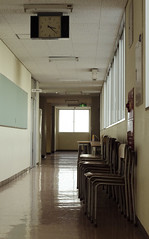It was most certainly one of the more involved classes I have ever been in, as Ulysses is renown for the intricate interweaving of avant-garde stream-of-consciousness narratives around a well-cataloged anchor of history.
Admittedly, I probably should have tried harder in that class, but James Joyce was so far out of my specialty that even just signing up for the class felt like I was going above and beyond the call of duty. I don’t remember much from the class
1 Well, besides two or three chapters involving S&M “subversion play.”
1, but what I do remember is the theme of “parallax.” The idea that multiple perspectives, despite the often disparate cacophony of voices, offer a fuller, more intriguing picture of a person or place than just one view can offer (and distort).

A bunch of the teachers went out to dinner last Friday where I got into a short conversation about how I was liking my stay at Ichikashi. When I said that I was loving it, the teacher (who is also new) gave me this look… “How about you,” I asked, interest piqued, “things aren’t going well?”
Japanese high schools, unlike American high schools, are elective. Because attendance is voluntary, there are often many reasons why a student would elect to attend high school. The most obvious reason is “continuing education,” of course, though, for many of the students, they are not planning on matriculating through to college. While a college degree may ensure at least an important introduction and a cursory glance at a “company man” position, even having a high school diploma is a marked competitive advantage over not one in such a decidedly service-oriented local economy.
Even for students who have their sights set on going to college, because matriculation is dependent upon testing into the university of their choice
2 Rather than an application packet.
2, there is little emphasis placed on maintaining academic rigor throughout the three years of high school, except that it may eventually improve one’s test score.As such, very little emphasis is placed on in-class grading (or even attendance), and so there remains no “academic standard” that is required for extracurricular participation in speech contests, clubs or sports. So, while maybe disingenuous in America, the notion of academic standards does suggest, at its core, that secondary education institutions exist for the purpose of education. By requiring a minimum GPA, policy implies that the emphasis of high school is academics and that all other campus activities are subservient (and should not be a detriment) to that.
It is not uncommon, therefore, to have students attend high school for a number of purposes
3 Existential as well as teleological.
3, with vastly disparate interest in academic endeavor.Ichikashi itself is a pretty big school. The school carries the standard three grades [grade-one—一年生 (ichi-nensei)—is the equivalent age of an American sophomore, while grade-three—三年生 (san-nensei)—students are seniors], which are divided into 10 or so home rooms ranked and sorted by test scores and “declared realms of emphasis”: A, B, C, D, E, F, G, H, I and S
4 S = “sports.”
4.As a special employee, contracted to teach higher-level English, I am assigned the top 三年生 and the top two classes of 二年生 (those going to North High for an exchange program).
My friend, on the other hand, spends a little bit of time with the higher level of 一年生, but also is tasked with the bulk of instructing 1-E, F, G, H, I and S in their mandatory English classes.
For the most part, they don’t appear to be unruly—that would be one thing—but, rather, they are hardly ever awake. Because their interests lie in other fields (mostly club activities, sports, and the like), and because these other interests require so much of their time, there is hardly room in their lives for academic investment. They come to school early for 6 AM practices, serve their lunch period at noon-time practice, and then stay late after school for 4 PM practice, often times not leaving school until around 6 or 7 for the one hour bike ride home.
If the sole goal of Japanese High Schools was purely academic, this would be seen as a major problem, but it doesn’t appear to be a big issue, at least in Ichikashi. After all, Ichikashi boasts one of the top baseball and soccer programs in the prefecture, one of the top high school judo competitors, the number one bowler in all of Japan (not even just “for her age group,” but amongst all of Japan), and one of the best high school brass bands in the nation:
That’s the Ichikashi Brass Band
5 And yes, they were playing while laying on the ground. Where’s your commitment, Aaron?
5. Ken says that they’ve really stepped up their game since he first arrived. In the past, they’ve always been known for being superbly technical, but in order to become nationally acclaimed, they must focus on their showmanship. Dutifully so, their last four performances (including the 4 songs they performed at Bunkasai, the one marching performance at Taiikusai, and the mini-musical performance earlier this morning before their Pirates of the Caribbean medley) have all focused on stage work and choreography, which are always just a few ounces of glitter shy of “dazzle.” That medley was a piece performed strictly for the Opening Ceremony of Ichikashi’s new sports complex (a large two-floor gym with a pseudo-indoor track and attached pool). Who knows how many hours of practice they committed to for that 8-minute performance that was only going to be seen by the Ichikashi student body and maybe 60-odd city dignitaries. It is unlikely that they will use that piece for any regional or national competitions, but that’s how things go around here.
That isn’t to say that nobody at Ichikashi cares about academics, otherwise they wouldn’t privately contract my teaching exchange program. In fact, just yesterday, two of our students won the Kashiwa regional English Language Speech Contest, and we’ll be spending the next month helping them prepare for the prefectural level.
That being said, our 2A students are preparing for their November 15th North High Exchange. Be sure to say hi.

No comments:
Post a Comment